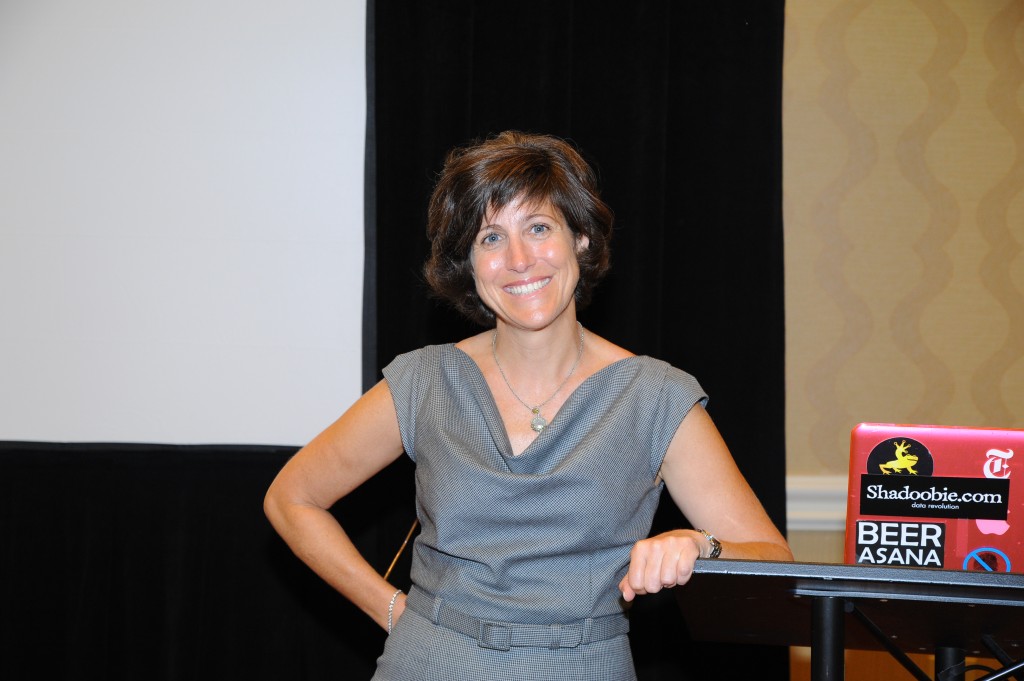FPRA 2013 Annual Conference: Breakout 3B, Future of Journalism and the Transition of the Overall Media Landscape, Kelly McBride
By Amanda Forbes Mestdagh, APR
Kelly McBride’s informative talk describes what has already happened in the rapid evolution of the media ecosystem and shares a new set of guiding principles for disseminating information in the 21st Century.
In looking at how the landscape has changed, Kelly shares how the sports industry seems to be five years ahead of the rest of media in the evolving ecosystem. A good example is ESPN where people go to a website for information and commentary, they read the blogs and even pay extra for real-time information, etc. No one believed that would be possible when ESPN started down that path, but it works.
Further exemplifying the evolving media was an example Kelly shared of DeAndre Jordan’s epic dunk. When the event happened, immediately tweets from pro basketball players, media and others erupted. That event then influenced the way the story was told – it was THE event in the news over the next 48 hours, because of the immediate response.
So Journalists are no longer the gatekeepers. Now the audience determines what’s important. We are only now coming to grips with the extent to which social media dictates the way journalism works and, to that end, how democracy works.
After all, journalism doesn’t work the same way as it did 10 years ago. When Texas state Sen. Wendy Davis filibustered for 11 hours to stop a vote of an abortion bill, it wasn’t covered by mainstream media at first and yet everyone knew it was going on because it went viral on twitter well into the night. It wasn’t until the following day that every media outlet covered it. As it was happening, it was just one small startup and an army of citizens that were the first to cover it.
Journalism is something that happens regardless of if you are a professional paid to do journalism. Anyone can do it. It happens often spontaneously. It’s a mass movement. Journalists never conceived this. If you want to be a professional in journalism now you have to understand it’s a thing that happens whether you intend it to or not.
So how do you teach journalism ethics, Kelly asks? There are all of these ideas and maps to describe the world of journalism, but the reality is that we don’t know how it actually works in this environment because it’s constantly changing.
Kelly further stated, “I can tell you what happened yesterday, but I can not tell you how [journalism] will happen tomorrow.”
And to that end, it’s not the same all over the world. In Vietnam you are no longer allowed to express political views on the Internet.
In looking at the Old World Journalism Ethics, you can see how journalists often found themselves in situations where some of these ethics would conflict with one or more of each other.
Old World Journalism Ethics:
- Truth
- Independence
- Minimize Harm
- Accountability
But if these aren’t working, then what is? The most dangerous ethical dilemma is when you say you have guiding principles, but you don’t actually have them. As Kelly pointed out, that’s exactly what journalists were facing. These principles were at one point valid, but the landscape has changed so dramatically.
So, how is it working out? Take the coverage of the Boston Marathon bombing as a prime example when the New York Post published an image of innocent people as suspects in the bombing with the headline “Feds seek these two pictured at Boston Marathon” on the cover of its issue. It was people on Reddit that identified those as suspects when they were not and now the families of those innocent individuals are suing the paper. These principles no longer work.
The biggest dilemma though, if the entire world can do journalism, how can you create standards for the entire world? It’s hard to hold the media accountable for erroneous reporting when we as media (general public/everyone) now are guilty as well.
So Kelly proposes a new approach:
Principles of the 21st Century:
- Truth
- Transparency
- Community
This works be first seeking truth and reporting it fully. Journalists must be transparent. We’re going to get it wrong, but if you tell people how you know or who your source is, the crowd will forgive you because they see where the reporting came from. Engage Community as an end. The community has the ability to inform itself regardless of if professional press exists. If media instead treat the community as a partner/equal the information takes on a different tone and then journalism works better.
For more information, check out Kelly’s new book, The New Ethics of Journalism at CQPress.com.
Kelly McBride is a writer, teacher and one of the country’s leading voices when it comes to media ethics. She has been on the faculty of The Poynter Institute for eight years. The world’s largest newsrooms, including The New York Times, The Washington Post, CNN, NPR and the BBC, frequently quote her expertise. Her current work involves Poynter’s Sense-Making Project, a Ford Foundation project examining the transformation of journalism from a profession of a few to a civic obligation of many, the effects of technology and democracy and the media habits of the millennial generation.

